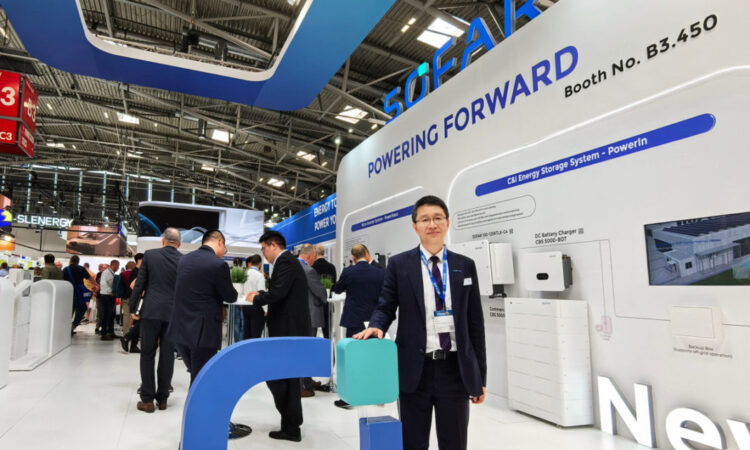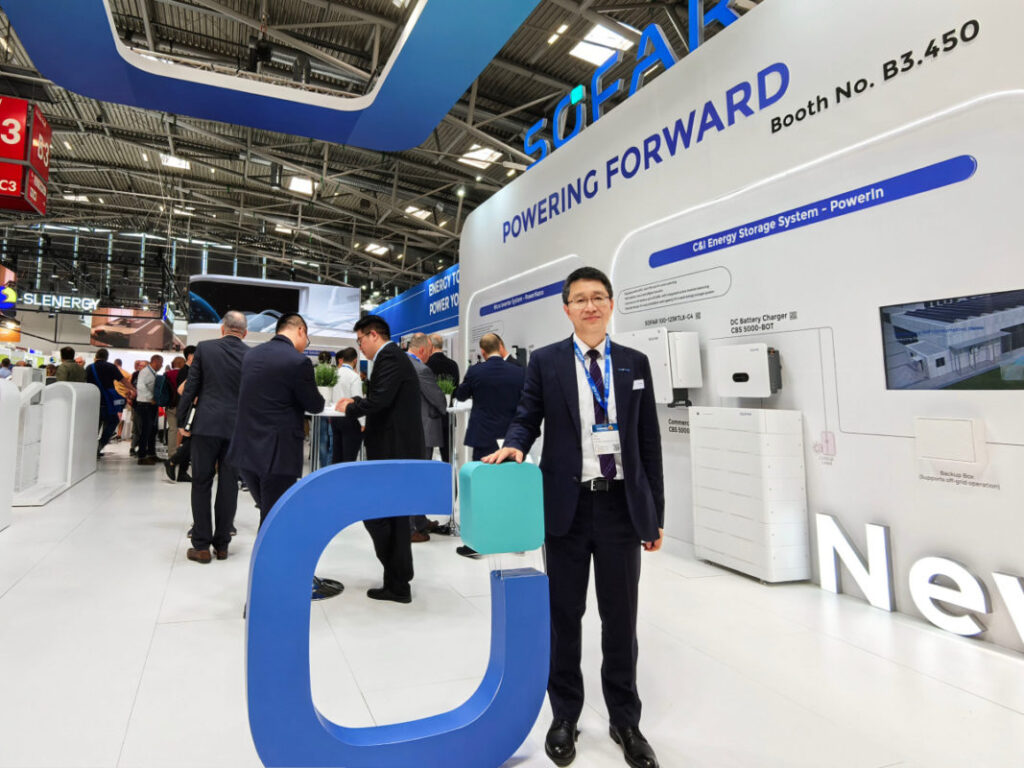Intersolar Europe 2023: SOFAR discusses product portfolio, strategy and vision for the future


SOFAR is a leading global provider of solar PV and energy storage solutions, with a comprehensive portfolio including PV and hybrid inverters, battery storage systems, central energy storage and smart energy management solutions for residential, commercial and industrial (C&I) and utility applications.
PV Tech met with Senior VP Guy Rong at Intersolar Europe to discuss the company’s products, technology, vision and future ambitions.
PV Tech: What are the main products that SOFAR is showcasing at this year’s Intersolar?
Guy Rong: We believe in a fusion of solar and storage technology, so the products will be based on a combination of inverter and battery. In fact, we have three product lines – PV inverter, hybrid inverter and the battery – and these can in turn cover three applications, which are residential, C&I and utilities. Three times three, so nine solutions in total for the market. I think with nine solutions, it’s possible to satisfy most market demands.
Obviously, there are visitors here from all over Europe and beyond. What do you see as your most important markets, in Europe specifically?
As of today, we are strong in several countries. Historically, Italy and Poland have been very positive for us, and since last year we’ve been looking to expand to other countries, particularly Germany. Germany is the largest market in Europe and is still growing fast, perhaps the only one today growing significantly faster than others on the continent, some of which have experienced slow growth in the first half of this year.
Having identified Germany as our major target, we’ve dedicated more resources here. Our results for the first quarter of this year have shown a significant increase compared to the same period in 2022 and we expect this momentum to continue.
You’ve also been exhibiting in South Africa and South Korea this year, so you clearly have ambitions outside just Europe.
As a solar company, you need to have global ambitions, because the sun shines everywhere. Wherever you have sun, you should have PV – and you should have our inverters!
That said, you need to prioritise. You can’t go everywhere at once, so you base your priorities on your ambition and your resources. We divide our markets into six regions – North America, Latin America, Asia Pacific, China, Europe and Middle East/Africa.
Our initial focus was on Europe, but we also need to look at other markets. South Africa is a unique market, with a lot of potential for storage, particularly off-grid storage. We think this is a key market for us, which is why we’ve started to build a team there from the beginning of this year. You mentioned South Korea, which is a totally different market. In South Korea, the only market now is for PV – no storage demand, and it’s a mature market, with no significant growth. You need to find the right partner there and I believe we’ve already found that partner, so we’re confident that we’ll see an uptick in business in due course.
What attracts you to a specific market? In Germany, for example – is it just growth rate? Is the regulatory environment an important consideration?
We are currently operating in more than 20 countries, but with different resource levels in each. We evaluate markets from various perspectives. Essentially speaking, market potential. A market needs to be stable over a long period, rather than come and go. We can’t dedicate too many resources to markets with the latter tendency. In Germany, there’s always long-term growth, hence it’s important to us. The country is also a storage market, an excellent fit for our product range.
How do you see PV and storage evolving over the next couple of years?
I believe that it will be difficult for PV to survive without storage. A few years ago, I gave a keynote speech at a seminar. In that speech, I said that we had already reached grid parity but, actually, grid parity is just the starting point. Grid parity doesn’t mean that people will necessarily use solar, because solar energy is relatively unstable. You need something to make it stable and that’s when storage comes on stage. So, if we can achieve grid parity with a combination of solar plus storage, then people will respond actively and the market will grow accordingly.
I look at the SOFAR booth today. It’s huge compared to your booth at events in years gone by, so it’s clear that the company is ambitious and on an upward trajectory. Could you give us a feel for that ambition and how it will manifest itself going forward?
I think this can be explained by our mission and vision. Our mission is technology drives green energy, the core of which is R&D. Innovation is the major driving force for SOFAR to grow its business. It’s not only a question of business model, it’s about hard technology. This is the first point. The second one is our vision, which is to be the leader of digital energy solutions. Energy is critical among all industries… everything is about energy, from coal to petrol to renewables. At SOFAR, we focus on solar and storage, and we are confident that our ambition of leadership will be achieved.
We are also planning to set up an R&D centre in Europe, which will mainly emphasize on software. We realise that software is as substantial as hardware, as you need software applications and a platform to integrate, for example, the EV charger, the heat pump, the intelligent socket, everything together with your inverter.
What’s the next important milestone for the company?
We are currently in the process of being listed on the Shenzhen stock market. That brings its own challenges, of course, in that there is pressure from shareholders and stock price. This is short-term, however, if you would like to follow your strategy, this is the long-term route to take. A question, as always, of finding a balance between the short and long term.





